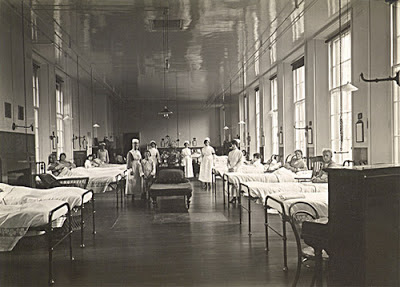 |
| A ward in the Royal Berkshire Hospital in the 1930s (Medical Museum Picture Library, RBH) |
From high up in the Royal Berks Hospital, you can see
the sky changing constantly over the rooftops of Reading. Sometimes squalls of
rain pass across the view, and the wind sucks at the picture windows that only
open an inch or so to let in some air. At other times the sky is a classic blue
laced with white cotton balls, or sun rays streak down eerily from behind layers
of thunderous-looking clouds.
There is life out there beneath that sky. Cars
come and go from the car park, its utilitarian concrete stained with damp. There
is the inevitable gas works shaped like a modern coliseum, and a church spire
peeks up through the treetops. Buses go up and down Craven Road and, beyond the red brick villas opposite the hospital, boys from a private school play
cricket in the watery sunshine. Beside me, my mother dozes with her glasses on, propped up on a Himalaya of pillows. She sleeps despite the eternal symphony of machines beeping and whirring, feeding drips and oxygen to the other women nodding off in beds and chairs across the bay, and of bin lids banging as the nurses discard their plastic aprons and gloves. A telephone rings and rings at the distant nurses’ station, and many times a day the rattling wheels of a trolley signals the approach of meals, medicines (“Time for your tablets!”), tea, and the ladies who mop the floors, trying to mask the faint smell of faeces with disinfectant.
At 2 o’clock the visitors begin to drift in, hovering at the mouth of the bay, afraid that stepping over the threshold will drop them down a rabbit hole. They perch on their plastic chairs from the day room, the men too jovial, too bracing – hahahaing to cover up their unease in a ward full of elderly women in their nighties. Meanwhile, the women visitors fuss about the tray tables, pointlessly rearranging the water jug here, the specs there, the tissues, the juice bottles, crossword puzzles, biscuit packets, and hand creams, like some kind of arcane chess game.
I overhear snippets of conversation straight out of an Alan Bennett story. “You don’t know what people are like, do you?” “Even though it was ever so cold this morning, I put my washing out. But before I came away, it started to rain and I took it all back in again. And now look at that sunshine!” “I can’t go out except in a wheelchair but I do manage. I don’t go mad. I said to the doctor when he came round to take my blood, what am I doing in here?” I scribble them all down as I hear them because this vigil, like everything else in life, is material – a window into other people’s lives and stories.
The nurses who take care of these frail elderly ladies, many of whom have wandered far beyond the borders of perception, are a remarkable caring collection of individuals. After the evening drug round, as the ward settles down for the long night, I drive home to my mother’s flat, strangely empty without her and yet full of her presence. As I try to drift off to sleep, the voices of those nurses - Irish, Romanian, Italian, Botswanan, Cameroonian, Welsh, Glaswegian - go round and round in my head in their multitudinous lilting accents from all over the world.
Lovely writing, Fiona. I love the snippets of conversation, and the life that's going on outside of the hospital. It's otherworldly at times in a hospital, and you capture that. I'm glad you were able to be there with your mother, but I'm also glad you're home! Beth
ReplyDelete